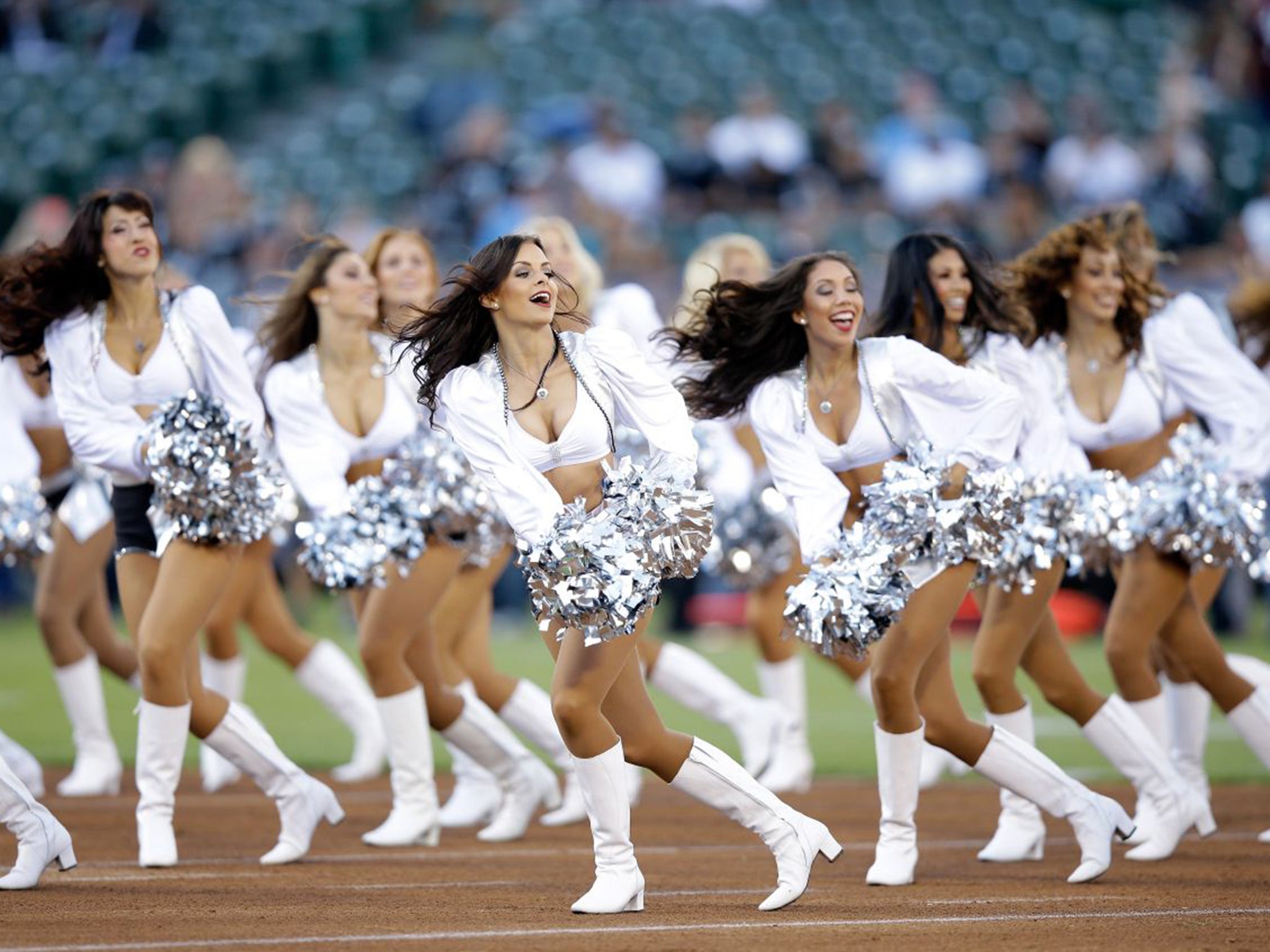Oakland Raiderettes: Cheerleaders celebrate new laws that mean they will be treated as employees
Shake those pom poms

They look like they are living out a teen dream. But in a raft of lawsuits over the past 18 months, America’s cheerleaders have been exposing the poor pay and questionable treatment they receive from many of the National Football League teams.
Since last week, however, it has become a much better time to shake your poms poms, at least in California. A new law means that cheerleaders for the state’s professional sports teams will finally be treated as employees, and provided with the wages and benefits that implies. AB202 – aka The Cheerleader Bill – was signed last week by Governor Jerry Brown, but its journey to his desk began early in 2014, when two former cheerleaders for the Oakland Raiders filed a class action lawsuit against the NFL team.
The ex-“Raiderettes”, Lacy T and Sarah G, claimed they were paid just $125 per game to perform at 10 games per season, and barely compensated for the hundreds of hours spent rehearsing, preparing and making public appearances on behalf of the team.
Super Bowl XLIX - in pictures
Show all 35Treated as freelancers, they got no sick leave, overtime pay or even the promise of a minimum wage. Such practices were supposedly illegal under federal law before AB202, yet they appear to be widespread throughout the NFL.
The Raiders eventually agreed a settlement of $1.25m to be shared between 90 current and former members of the Raiderette squad, and last year offered Raiderettes a new contract guaranteeing a $9 per hour minimum wage for all their work, almost tripling their annual pay to around $3,200. That’s still not much compared with the men who entertain the crowds as NFL team mascots, and who reportedly earn an average salary of $30,000 to dress up as giant soft toys.
Since the Raiderettes case, cheerleaders from four more NFL squads have filed fair-wage lawsuits, including the New York Jets’ “Flight Crew” squad, and the Cincinnati Bengals’ “Ben-Gals”. Florida’s Tampa Bay Buccaneers recently agreed a $825,000 settlement with their cheerleaders.
Yet when the Buffalo Bills faced a similar lawsuit last year, the team simply disbanded its cheerleading squad, the “Buffalo Jills” – who had allegedly suffered some of the worst treatment in the league.
Jills were forced to pay for their own uniforms, at $650 a pop, and to undergo weekly “jiggle tests”, doing jumping jacks so that coaches could test whether their flesh wobbled. They also allegedly endured sexual harassment from wealthy team sponsors and – unlike cheerleaders for other teams, who at least earned a pittance – Jills received no wages whatsoever.
Some of the squads’ cheerleading handbooks provide further details of the condescension and humiliation to which the women have been subjected. A Raiderettes handbook, thought to have been updated since the lawsuit, included instructions not to dally with players or with married men in the team’s corporate office. A Jills manual, meanwhile, provided advice on how frequently cheerleaders ought to change their tampons.
The new California law will come into effect in January 2016 and apply to cheerleaders working for any professional sports team. There have been similar issues reported in other leagues, such as the National Hockey League and National Basketball Association, but, said Leslie Levy, the lawyer who fought the Raiderettes’ lawsuit, “The NFL is the most blatant and extreme case, as well as being the most profitable of professional sports. It’s kind of ironic that the sport which makes the most money pays women the least.”
When California Assemblywoman Lorena Gonzalez first introduced the AB202 bill, many of her fellow state politicians were sceptical. “I got ribbed about it a little,” said Ms Gonzalez, a Democrat. “But once people understood what we were trying to do, it passed with bipartisan support.” The law’s implications go beyond cheerleading, and to the heart of issues such as pay equality and employment norms in the new so-called “ sharing economy”.
One major challenge for the lawmakers and lawyers involved has been to persuade cheerleaders to come forward, so stifled are they by a mixture of fear and loyalty. Herself a former cheerleader at high school and Stanford University, Ms Gonzalez said she understood how the women could remain devoted to their teams even if they were treated poorly. “I still have immense loyalty to Stanford football,” she said. “You spend a couple of years doing that and you get almost brainwashed.”
A third Raiderette, Caitlin Yates, brought another wage-theft lawsuit against the Raiders in 2014. “Our coaches, they’ve honestly really bullied us into thinking, ‘You’re just so lucky to be here, a million girls would kill to have your spot,’” Ms Yates told National Public Radio last year. “But there’s also a lot of other professions out there that a million girls would kill to have that spot – and they get paid very well for it.”
Subscribe to Independent Premium to bookmark this article
Want to bookmark your favourite articles and stories to read or reference later? Start your Independent Premium subscription today.

Join our commenting forum
Join thought-provoking conversations, follow other Independent readers and see their replies